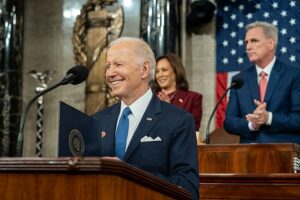An Election of “Firsts”

New York Democratic congressional candidate Alexandria Ocasio-Cortez speaks at a rally calling on Sen. Jeff Flake (R-AZ) to reject Judge Brett Kavanaugh's nomination to the Supreme Court on October 1, 2018 in Boston, Massachusetts. (Photo: Scott Eisen/Getty Images)

Yesterday’s election saw large numbers of Americans turning up to cast their votes. The New York Times is estimating that some 114 million ballots were cast this year, well above the 83 million votes cast in 2014 and 91 million ballots cast in 2010.
As we now know, the U.S. Senate stayed red, with a majority of the seats going to the Republican Party; while the U.S. House of Representatives turned blue, with the Democratic party being able to flip the 23 needed Republican seats to win the majority.
Regardless of your party affiliation, and whether or not you are perceiving the results as a success or failure, there is no denying that the 2018 midterm election will go down as the elections of many “firsts”. As a recap, here is a list of first-time successes we witnessed last night that reached across party lines:
-
- Colorado elects the nation’s first openly gay governor, Jared Polis (D). While former New Jersey Governor Jim McGreevey came out as gay while in office in 2004, this was the first time Americans had the opportunity to successfully vote an openly gay gubernatorial candidate into office.
. . - Florida passes Amendment 4, meaning that for the first time in the states history, formerly convicted felons will be eligible to vote in the next election. To grasp the significance of this vote, there are currently 1.5 million convicted felons in Florida (out of the approx. 21 million residents) that have been voiceless in one of the closest election races we have seen. While this amendment excludes eligibility for felons convicted of murder and sexual offenses, there is no doubt this will have a profound effect in this swing state. It is anticipated that this amendment will benefit Florida’s black population most, who are disproportionately convicted of crimes.
- Colorado elects the nation’s first openly gay governor, Jared Polis (D). While former New Jersey Governor Jim McGreevey came out as gay while in office in 2004, this was the first time Americans had the opportunity to successfully vote an openly gay gubernatorial candidate into office.
-
- Janet Mills (D) has been elected as the first female governor of Maine.
-
- New York has elected Alexandria Ocasio-Cortez (D), who now takes the title as the youngest woman in history to be voted into congress at only 29-years old. Ocasio-Cortez first made headlines in the primary, where she defeated Democratic Rep. Joe Crowley with over 75% of the popular vote, a turnout not many had anticipated.
-
- Both New Mexico and Kansas have elected the countries first two Native American women into congress. Deb Haaland (D-New Mexico) and Sharice Davids (D- Kansas) will now join just two more members in congress, both of whom are male, that identify as Native American.
-
- Florida has re-elected Amber Mariano (R) into the Florida House of Representatives for a second term, continuing her title as the youngest member to be elected in the state. At the start of her first term in office, Mariano had just celebrated her 21st birthday.
-
- Ilhan Omar (D) of Minnesota and Rashida Tlaib (D) of Michigan have elected the first two Muslim women into congress.
These historic “firsts” only represent the candidates that won their seats, however, tremendous diversity was shown in races across the country, including candidates that lost the midterm election. To highlight a few; Christine Hallquist who ran as the nation’s first openly trans gubernatorial candidate, Paulette Jordan who hoped to become the country’s first Native American governor, Kristi Noem who ran as South Dakota’s first woman governor, and Joe Neguse who would have been the first African American elected to the US House from Colorado.
If there is one thing to take away from this election, it is that despite the current political issues that divide us, we have proven that boundaries can still be broken. We made history in 2018. A history, that while long overdue, will continue to open doors in the elections to come.
Brittany is a Master of Arts in International Relations candidate at New York University’s Graduate School of Arts and Science with a focus on the Middle East. She holds a Bachelors of Science in Psychology from the University of Central Florida, with a certificate in Victim Advocacy and concentration in Middle Eastern studies. She currently interns with the International Rescue Committee, working in the communications department with the International Network for Education in Emergencies.





